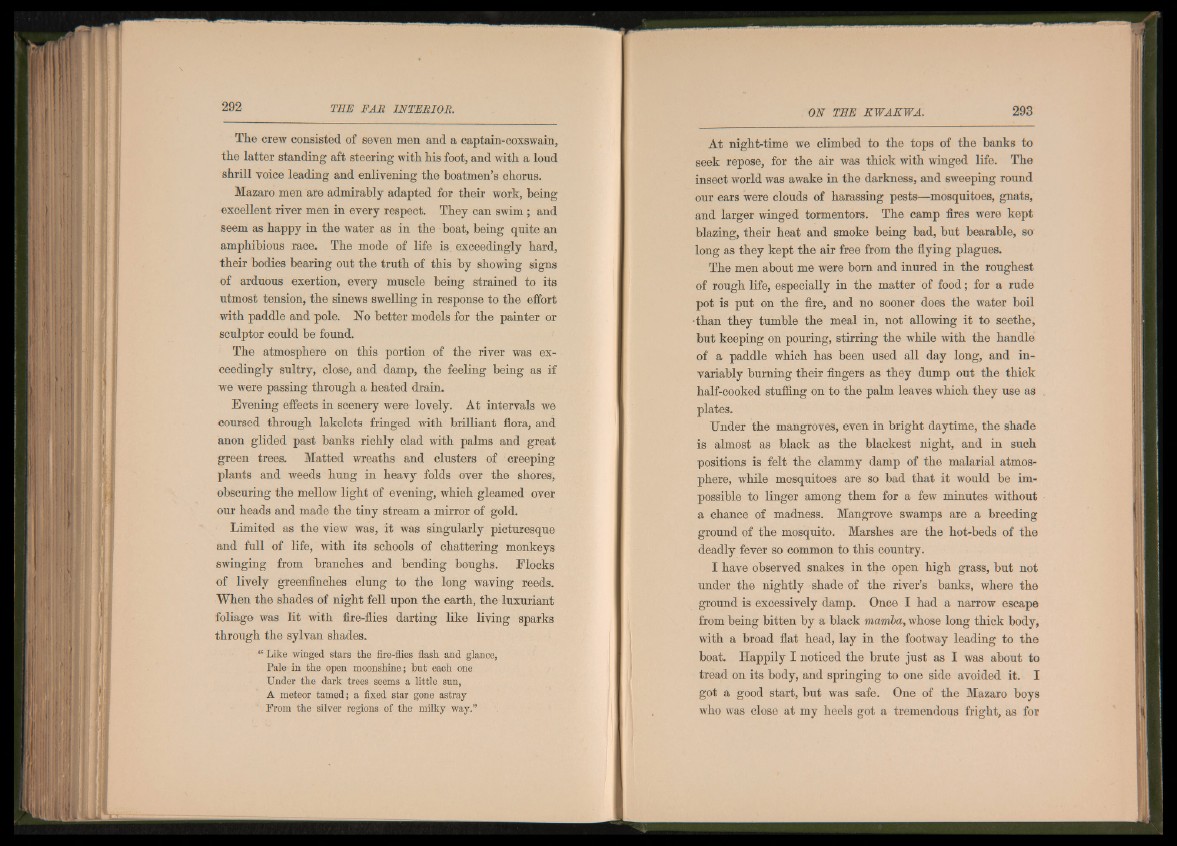
The crew consisted of seven men and a captain-coxswain,
the latter standing aft steering with his foot, and with a loud
shrill voice leading and enlivening the boatmen’s chorus.
Mazaro men are admirably adapted for their work, being
excellent river men in every respect. They can swim; and
seem as happy in the water as in the boat, being quite an
amphibious race. The mode of life is exceedingly hard,
their bodies bearing out the truth of this by showing signs
of arduous exertion, every muscle being strained to its
utmost tension, the sinews swelling in response to the effort
with paddle and pole. No better models for the painter or
sculptor could be found.
The atmosphere on this portion of the river was exceedingly
sultry, close, and damp, the feeling being as if
we were passing through a heated drain.
Evening effects in scenery were lovely. At intervals we
coursed through lakelets fringed with brilliant flora, and
anon glided past banks richly clad with palms and great
green trees. Matted wreaths and clusters of creeping
plants and weeds hung in heavy folds over the shores,
obscuring the mellow light of evening, which gleamed over
our heads and made the tiny stream a mirror of gold.
Limited as the view was, it was singularly picturesque
and full of life, with its schools of chattering monkeys
swinging from branches and bending boughs. Elocks
of lively greenfinches clung to the long waving reeds.
When the shades of night fell upon the earth, the luxuriant
foliage was lit with fire-flies darting like living sparks
through the sylvan shades.
“ Like winged stars the fire-flies flash and glance,
Pale in the open moonshine; but each one
Under the dark trees seems a little sun,
A meteor tamed; a fixed star gone astray
Prom the silver regions of the milky way.”
At night-time we climbed to the tops of the banks to
seek repose, for the air was thick with winged life. The
insect world was awake in the darkness, and sweeping round
our ears were clouds of harassing pests—mosquitoes, gnats,
and larger winged tormentors. The camp fires were kept
blazing, their heat and smoke being bad, but bearable, so
long as they kept the air free from the flying plagues.
The men about me were bom and inured in the roughest
of rough life, especially in the matter of food; for a rude
pot is put on the fire, and no sooner does the water boil
-than they tumble the meal in, not allowing it to seethe,
but keeping on pouring, stirring the while with the handle
of a paddle which has been used all day long, and invariably
burning their fingers as they dump out the thick
half-cooked stuffing on to the palm leaves which they use as
plates.
Under the mangroves, even in bright daytime, the shade
is almost as black as the blackest night, and in such
positions is felt the clammy damp of the malarial atmosphere,
while mosquitoes are so bad that it would be impossible
to linger among them for a few minutes without
a chance of madness. Mangrove swamps are a breeding
ground of the mosquito. Marshes are the hot-beds of the
deadly fever so common to this country.
I have observed snakes in the open high grass, but not
under the nightly shade of the river’s banks, where the
ground is excessively damp. Once I had a narrow escape
from being bitten by a black mamba, whose long thick body,
with a broad flat head, lay in the footway leading to the
boat. Happily I noticed the brute just as I was about to
tread on its body, and springing to one side avoided it. I
got a good start, but was safe. One of the Mazaro boys
who was close at my heels got a tremendous fright, as for